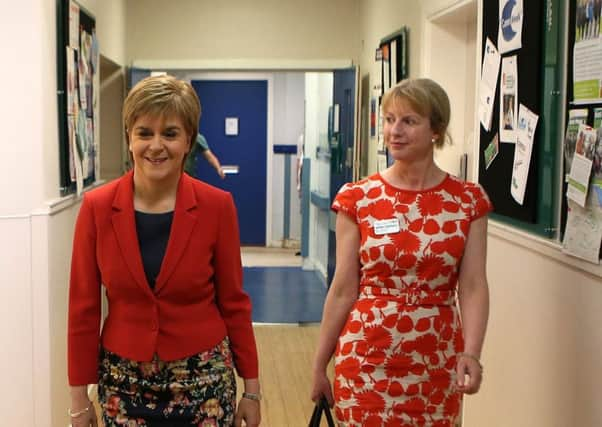Brian Monteith: SNP will be under fire for handling of NHS


Then the First Minister’s bluff was called with some masterly statecraft by the Prime Minister who not only said the timing for another independence referendum was wrong (while carefully not denying there could be one in the future) – but also then went on to put her refusal to a democratic test by calling an early general election.
This challenged Nicola Sturgeon’s strategy for independence and it failed woefully. The resulting loss of 21 SNP MPs, including Alex Salmond and Angus Robertson to Tory candidates, saw not only a Conservative recovery that could not have been expected a few years ago, but also a minor Labour revival on the back of Corbyn offering a more appetising programme for those who are red in tooth and claw. The SNP suffered a classic pincer movement and therein lies the germ of what will be attempted this year.
Advertisement
Hide AdAdvertisement
Hide AdAfter the 1979 defeat of Labour’s plans for devolution and the resulting election of Margaret Thatcher’s Conservative government (which we should always remind ourselves, was only made possible by the SNP MPs siding with the Tories to bring down Jim Callaghan’s government) Scotland’s politics was then dominated for the next 18 years by the constitutional issue of how devolution was necessary and might be achieved. Since 1997, when it was obtained by the return of a Labour government, constitutional dominance has not withered on the vine but, as some of us predicted, only become ever more prominent.
First we had the overbearing and wholly unjustified smugness born of a belief that the Scottish parliament was overnight superior to what passed for democratic decision making at Westminster. The conceit that Holyrood could do no wrong was the narrative that we were meant to swallow, but it did not take long before the sheen wore off. Inevitably, as was always predictable, for oppositions usually become governments eventually, the SNP took office and has now ruled for what is approaching its 11th year. In that time, with its focus being on separating Scotland from the rest of the United Kingdom, the division in Scottish society has reached unprecedented levels and all the scars have not yet healed. Nor has the threat of them being newly ripped open by a further independence referendum been taken off the table. The First Minister still occasionally reaches for her political sabre and gives it a good rattle, although more and more voters are evidently becoming tired of the sound and wish she would just put it away.
The window of opportunity for that referendum now looks to have closed – and even were the hardest of Brexits to come about due to a breakdown of negotiations between the EU and UK negotiators, Scotland being outside the EU’s Single Market would be far less devastating than being outside the UK Single Market – and the Scottish people have sussed this. As a result the constitutional issue may have the odd spasm but it will become more infrequent and less demonstrative. What then can fill the void that the absence of constitutional politics will leave?
It is not enough to say that there will be more attention given to the Scottish Government’s record, although this much will be true. What we can see, in the approach by the official opposition – the Scottish Conservative and Unionist MSPs led by Ruth Davidson – and Richard Leonard’s new model Labour Party bringing up the rear, is that Scotland’s National Health Service will become the key battleground. This may surprise some, given that the SNP has repeatedly said education is its number one priority (I know this is an oxymoron given the party is by its own definition all about achieving independence, but let’s leave that to the side).
While there are good reasons why education came to the fore as a political issue – such as international benchmarks exposing just how badly and quickly Scottish educational performance was falling behind countries like Estonia and Vietnam, previously thought as mere minnows – it was also true that so long as the NHS in the rest of the UK performed worse the SNP government could simply claim it was doing better than the rest.
This tactic of deflection has now worn thin and the evidence that Scotland’s NHS is in really serious trouble is growing. The reason for this is not just that the evidence shows it is true, but that the Conservative and Labour opposition are both using Freedom of Information requests and highly embarrassing Audit Scotland reports to bombard Scottish Health secretary Shona Robison with exposés of failures on the SNP’s watch.
Given that since devolution began the governments of Blair, Brown, Cameron and May have all increased spending on the NHS there is no reason to believe that a lack of funds should be the problem. Indeed, given that the increased funding given to the SNP government in recent years by Cameron and May has not been fully passed on to the Scottish NHS the buck stops firmly with Nicola Sturgeon. The fact that the Health Secretary can be viewed by her opponents as both hapless and out of her depth, without any sense of partisan gratuitousness, encourages the Conservatives and Labour to circle above her like vultures.
Be it the failure of SNP policies on bed blocking, abolishing single paramedic ambulances or using the wrong flu jabs – there will be more and more evidence presented to Scottish voters that the NHS is not safe in SNP hands.
Advertisement
Hide AdAdvertisement
Hide AdDoes someone in Kirkcudbright really care if times for cancer treatment appointments are worse in England? If it were ever true then I doubt it is anymore. I expect the NHS will be the real political issue for the Scottish Government in 2018 – and it is long overdue.
l Brian Monteith is editor of ThinkScotland.org